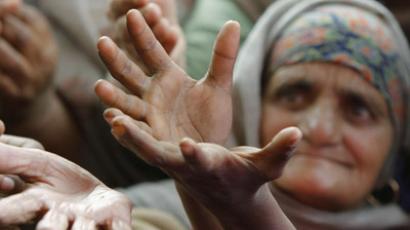Legacy of colonialism haunts India, 65 years after independence
People across India will hit the streets Wednesday in celebration. Colorful kites will decorate the skies, symbolizing the country’s anniversary of freedom from British rule.
But 65 years on, some believe England’s colonialism still haunts the country.While India has come a long way since gaining independence in 1947, it’s still faced with ongoing hardships that were shaped by the British Empire's domination of the country. Modern India has the second-fastest growing economy in the world, but according to the International Monetary Fund’s (IMF) 2012 World Economic Outlook Report, it's still a developing nation.And more than six decades after the end of Britain’s colonial rule, the question remains whether India’s economy would be better off had England never taken over the country.The Indian economy was the second-largest in the world – until the British arrived. In fact, British economist Angus Maddison argues that India’s share of the global income went from 27 per cent in 1700 to 3.8 per cent in 1950.And while Europe and the US benefited from the Industrial Revolution, India’s economy stayed stagnant for 90 years.Reasons for the country’s stagnation include Britain's establishment of an agricultural base in India, thereby providing cheap raw materials to England at the cost of local citizens.A study by Maddison entitled “The Economic and Social Impact of Colonial Rule in India” states that the British welcomed Indian economic development if it benefited their markets – but refused to help in areas where they saw conflict with their own interests.The direct results were devastating. India was left as an economically underdeveloped nation marked by hunger, poverty, and a low national income.Recovering from such devastation doesn’t happen overnight, and India is still struggling to win its battle with poverty.In 2011, the World Bank stated that 32.7 per cent of Indians live below the international poverty line of $1.25 per day, while 68.7 per cent – about eight hundred and thirty million people – live on less than $2 per day (this number includes those living on $1.25 or less a day). It’s a situation that is reminiscent – and perhaps a direct result – of the 40 famines India faced under British rule, which led to the deaths of 59 million people. Today, Britain is seemingly trying to make up for its less-than-impressive history with India, sending the country approximately $439 million a year in aid. While the handout may make London feel warm inside, it hasn’t been met with open arms by New Dehli. “We do not require the aid,” India’s Finance Minister, Pranab Mukherjee, said in a statement to Parliament in February.“It is a peanut in our total development exercises,” he said.And Mukherjee isn’t the only one who feels this way. “It’s a tiny amount, relative both to India’s needs and government spending. It’s not that we don’t have a huge development problem – we do. But these are really things that we must do with our own resources,” Economics Professor Jayati Ghosh told RT.“The amount of money the British provide is so little that it’s really not noticed,” she said.It’s these sentiments that have stung the egos of many who stand behind the UK’s spending allowance to India. Officials at Britain’s Department for International Development told the Indian government that canceling the spending would cause “grave political embarrassment” for Britain, the Telegraph reported.The UK seems keen on continuing to send money to India – which has many wondering whether the country is still stuck in a colonial mindset.“I think the notion that we are dependent on the former masters coming and dolling out bits of money or advice to solve our poverty is mistaken… people don’t think the US and Europe have all the answers anymore,” Ghosh said. India’s freedom to defend itself as an independent nation is one of many reasons the country will be celebrating on Wednesday. And as the festivities get underway, many will undoubtedly take time to ponder how differently India might look if its history books were filled with a different story.














